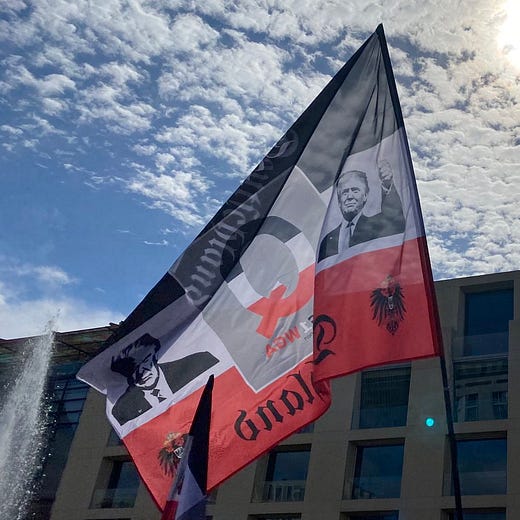We're All Living in America: German QAnon Coup Edition
The Reichsbürgers want to kick out America and restore traditional German monarchy, but they can't escape the pull of America's Internet culture.
Germany carried out one of the largest counterterrorism operations in its history on Wednesday, sending hundreds of police and special forces to break up a far-right network accused of plotting a coup d’etat.
Dozens of people, including at least one active-duty special forces soldier, are accused of plotting to overthrow the German republic and put an obscure aristocrat called “Prince Heinrich XIII” in power.
The story has a very bizarre — and very American — element to it. The alleged putschists belong to the Reichsbürger movement, which is heavily influenced not only by European fascism, but also by QAnon and the “sovereign citizens.”
It’s a testament to American soft power. U.S. political culture has infected the worldview of just about everyone, even those who see the United States as an enemy or pride themselves on resisting foreign influence.
That goes as much for marginal ideas as mainstream ones. The prestige of American media and the English language means that the ramblings of extremely online weirdos can catch on outside of America’s borders, becoming beliefs that foreigners are willing to kill and die for.
Call it soft power blowback.
Europe is no stranger to extreme nationalism and attempts at restoring old royals to the throne. (It’s famously caused quite a few wars.) But the Reichsbürger movement is something different.
When the Reichsbürgers say they don’t recognize the German republic, it doesn’t just mean they oppose its legitimacy. It means they don’t believe the Federal Republic of Germany exists. Instead, there is the legitimate German Empire with the same borders it had in 1937, and then there is the fake bureaucracy created by a U.S.-British-French occupation.
Reichsbürgers print out their own ID documents, and spam the courts with objections based on the rules of their imaginary, parallel legal system. That should sound familiar to anyone who has spent time around American libertarians.
Since the mid 20th century, the “sovereign citizen” movement has grown on American soil. Sovereign citizens deny the existence of the United States government as it is commonly understood. Citing obscure elements of admiralty law, sovereign citizens claim that U.S. citizenship does not apply to them and U.S. court decisions are invalid.
Of course, no authority is going to be talked out of believing in its own existence. Sovereign citizens have tried to reason their way out of police custody with pathetic, albeit sometimes amusing, results:
The term “sovereign citizen” was coined by American white nationalists, but the beliefs have spread far beyond those circles. The Moorish movement adds a black nationalist twist, preaching that black Americans are really citizens of an imaginary version of Morocco, citing an old U.S.-Moroccan treaty.
There’s even a Russian version of the movement: “Soviet citizens” who believe the Soviet Union was never dissolved, making modern Russia an illegitimate successor. And, of course, there’s the Reichsbürgers, who are about 19,000 strong.
The more one thinks about it, the weirder it gets. The American national project was all about throwing out the British monarchy, breaking the indigenous civilizations, and rebuilding on the ruins with European immigrants. American conservatism is distant from, even opposed to, Old World traditionalism.
Yet people who want to restore monarchy or Communism find themselves drawn to this very American form of rebellion. While they draw on old symbols of legitimacy, these movements are not about divine rule or the general will. On the contrary, they act as if individuals can simply opt out of social reality and substitute their own.
Social media makes it much easier to stew in sovereign citizen beliefs. The Internet has created space for human communities detached from the physical world. Interacting with other human beings in person usually serves as a reality check, but an increasing portion of people’s social lives is lived through a screen, with an automatic filter for likeminded voices.
Most of the Internet is in English, and most of that content is produced for Americans or Americanized audiences. Unsurprisingly, American conversations take up a lot of space on the social networks. One of those conversations is QAnon.
It’s hard to describe exactly what QAnon is at this point: a conspiracy theory, a political movement, a religious sect. At its core, QAnon is the belief in a secret battle within the American “deep state.” On one side, there is a liberal cabal that tortures children for their life-force. On the other side, there is a “patriotic” resistance led by Donald Trump, who has taken on messianic qualities.
The name “QAnon” comes from the belief that a military intelligence officer with a Q-level security clearance was anonymously revealing all the secrets of the deep state on an anime-themed message board. No, really.
QAnon has caught on in surprising places. The belief has popped up not only in other Anglo countries, but also in Latin America and continental Europe, where it has piggybacked on the backlash to coronavirus restrictions.
Some Reichsbürgers claim that, since the United States is an occupying power, it will take a conflict in the American deep state to restore the German nation. And the German word for “alt-thinker” (Querdenker) also starts with “Q,” a coincidence that one Reichsbürger publication has played up.
The alleged coup plot is actually a bit of a throwback. While the sovereign citizens and QAnon believers have immersed themselves in magical thinking, the followers of Prince Heinrich XIII seem to understand that political sovereignty actually requites some kind of force behind it.
Yet even the conservatives who believe that America is an enemy occupier, who reject modernity and embrace tradition, who literally want to return to 1937 — even they cannot escape the pull of extremely online American obsessions.
In the words of the famous German metal band Rammstein, “we’re all living in America, Amerika ist wunderbar!”









